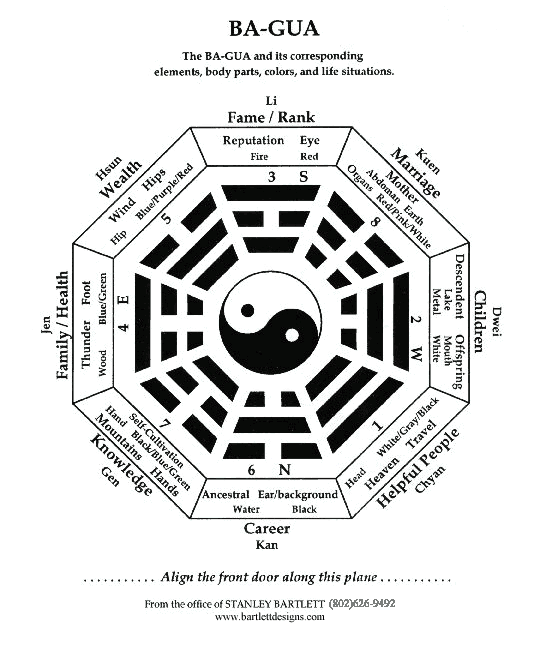11 Feng Shui – 風水(Fēngshuǐ)
Song Shuhang
simplified Chinese: 風水; pinyin: Fēngshuǐ
Feng Shui
Feng Shui, literally meaning wind and water, is a concept deeply rooted in traditional Chinese culture. It is the ancient art of placing objects in a way to optimize the flow of chi in spaces such as one’s home, workplace, gardens, and so forth. Feng Shui dates back to thousands of years, and its principles are present in other countries’ cultures such as Shinto in Japan and Buddhism in India. In following Feng Shui practices, people become able to live in balance and harmony with their surrounding environments.
A fundamental aspect of Feng Shui is chi, which refers to the life energy present in the world around us and all living beings according to Chinese culture. Chi is divided into two parts: yin and yang. When the flow or balance of yin and yang is disrupted, it can lead to a person’s deteriorating health or even death. To balance these two forces requires the placement of objects in specific positions and directions through the idea of controlling the five natural elements and significance behind the Chinese compass. The five elements are fire, earth, metal, water, and wood. Each element interacts differently with each other; some elements support the other and some counter each other. For example, wood counters earth because the roots of plants penetrate through the soil and can crack rocks apart, and earth supports metal because metal can only form within the large pressures underground. Meanwhile, south is correlated with summer, north with winter, west with autumn, and east with spring.
As such, both direction and placement of certain objects affect the flow of chi, and these ideas can be used in architecture. The Great Wall of China for example is curved in order to continue the flow of chi. Beds should be directed away from the door as doing otherwise means it is in the death position, referring to how the dead would be carried away through doors. The bed also should not face the bathroom as it belongs to the water element and exudes yin energy. If it is inconvenient to direct the bed elsewhere, one could use mirrors. Mirrors are able to deflect chi, and by angling them in certain ways, it is possible to redirect yin out of the house. However, mirrors are also of the water element, and it is said that placing them above one’s nose leads to bad luck as one’s head is now below the surface of water. Feng Shui is difficult to apply correctly due to its myriad rules, the varying interpretations of them, and the infinite possible situations. Nevertheless, it continues to be used in architecture in the real world and even in fictional media.
“Feng Shui.” Education, https://education.nationalgeographic.org/resource/feng-shui/.
Meissner, Daniel. “Feng Shui: The Wind and Water.” Feng Shui, https://academic.mu.edu/meissnerd/samson.html.
Migala, Jessica. “What Is Feng Shui? A Guide to Creating Harmony in Your Home.” EverydayHealth.com, 1 Mar. 2023, https://www.everydayhealth.com/photogallery/feng-shui-your-home.aspx.
Stalker, Jon. “Feng Shui Bedroom Rules Uncovered, Why the Bed Can’t Face the Door.” Sleep Talk Blog, 30 July 2021, https://www.bedstar.co.uk/sleep-talk/health-wellbeing/why-the-bed-cant-face-the-door-fengshui-and-how-you-can-use-it-in-your-bedroom.html.


